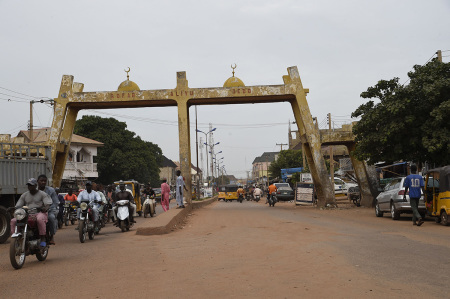Evangelical church raises concerns over religious tolerance ahead of Nigeria’s presidential elections

As Nigeria is preparing for its presidential election amid unabated violence, one of the largest Christian denominations in the country has warned of a “deep and irredeemable crisis” if the religion or region of the candidates is given more importance than the constitutional values of religious tolerance.
“Given the pluralistic configuration of Nigeria, we have seen deliberate effort since independence to preserve the peace and unity of the country by ensuring that the presidency is balanced in terms of religion and region,” the Rev. Stephen Baba Panya, president of the Evangelical Church Winning All denomination, noted in a statement, according to Nigeria’s Daily Post newspaper.
As per an unofficial agreement among Nigeria’s parties and politicians, the presidency should alternate between a Christian from the south and a Muslim from the north.
About half of the population of Nigeria is Muslim, most of whom live in the north, where Islamist groups like Boko Haram, Fulani herdsmen and Islamic State West Africa Province have launched attacks on Christians in an apparent move to make a case for the separation of the Muslim-majority north from the Christian-majority south.
“Our national interest is greater than any individual or group interest,” the Rev. Panya stressed, calling on “all the political parties to maintain this balance for the 2023 presidential election and to caution those who are brazenly advocating for a Muslim/Muslim ticket to reconsider their unrealistic stance.”
Panya further underlined that “we do not, and will not support a Christian/Christian ticket or a Muslim/Muslim ticket as this is capable of plunging the nation into deep and irredeemable crisis.”
He added, “the corporate existence of Nigeria is founded on the principles of justice, fairness and equity.”
Section 23 of the 1999 Constitution, identifies religious tolerance and social justice as the national values which, Panya said, "must guide our conduct and relationships.”
Nigeria’s incumbent President Muhammadu Buhari, a northern Muslim from the ruling All Progressives Congress Party, has served two terms, and the presidency is now expected to go to a candidate from the south.
However, the opposition Peoples Democratic Party has chosen Atiku Abubakar, 75, a former vice president and political stalwart who is a northern Muslim, as its presidential candidate.
There’s a need, the ECWA said, to “do away with primordial sentiments that seek to divide and destroy us and embrace the ideals of peace, love, unity and progress.”
The elections will be held next year amid rising attacks on Christians.
Open Doors USA, which monitors persecution in over 60 countries, reported that at least 4,650 Christians were killed between Oct. 1, 2020, and Sept. 30, 2021. That is an increase from 3,530 the previous year. Additionally, more than 2,500 Christians were kidnapped, up from 990 a year earlier.
Last month, the Islamic State terror group released a video showing the execution of some 20 Christian civilians in Borno State in revenge for the killing of their leader in Syria by the United States special forces in February.
The video, published on an IS-linked news outlet, showed a masked militant executing a Christian civilian while saying it was revenge for the killing of their leader Abu Ibrahim al-Hashimi al-Qurashi, an Iraqi Islamic terrorist and the second “caliph” of the Islamic State.
In another recent attack, unidentified gunmen stormed a Catholic parish in northern Nigeria and abducted two priests, identified as Fr. Stephen Ojapa and Fr. Oliver Okpara from the Catholic Diocese of Sokoto, and two unidentified boys from St. Patrick Catholic Church in Gidan Maikambo area of Katsina state’s Kafur Local Government Area, Vatican News reported.
Nigeria was previously included on the U.S. State Department’s “Countries of Particular Concern” list of governments that engage in or tolerate egregious violations of religious freedom. But Secretary of State Antony Blinken removed Nigeria from the list last November, just under a year after then-Secretary of State Mike Pompeo added that country to the list in December 2020.
Amid accusations that the Biden administration pushed a “political narrative” as the West African country faces increasing extremist and communal violence, the State Department released its annual international religious freedom report on Nigeria earlier this month, saying, “There was pervasive violence involving predominantly Muslim herders and mostly Christian, but also Muslim, farmers, particularly in the North Central, but also in the North West (where most farmers were Muslim) and Southwest regions.”
Nina Shea, the director of the U.S.-based Hudson Institute’s Center for Religious Freedom, told The Christian Post in an email at the time that “the State Department has missed the big picture of vulnerable Christian minorities of northern Nigeria being repeatedly attacked and driven from their villages by Muslim extremists and their agents who act with complete impunity.”
“Authorities fail to investigate and prosecute the perpetrators of these large-scale atrocities, and moreover prosecute and threaten local journalists who report on them,” she said.





















